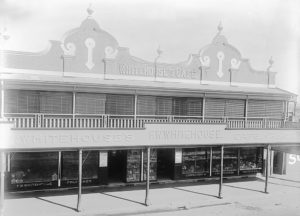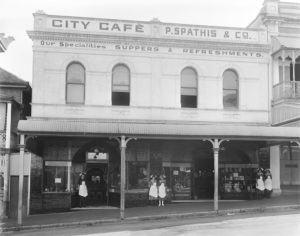Over the years Ipswich has been home to many interesting and delicious eateries, restaurants and cafes. Today, the city boasts a wide selection of coffee shops and early morning and late night eateries that serve just about every cuisine imaginable whether it be yummy cakes and pastries, hearty German meals, interesting Greek fare or quality seasonal eats. Historically, Ipswich played host to many traditional cafes that were popular places to meet friends and family and host events. Below is a list of some of the popular cafes to dine at during Ipswich’s early years.
Londy’s Café
Londy’s Café was located on 165 Brisbane Street, which was on the corner of Ellenborough Street near the old North Star Hotel. It was owned and operated by Harry and Mick Londy who were uncle and nephew, respectively. Harry Leondarakis (later Londy) was born in Greece and travelled to Australia at the age of 14 where he worked in Toowoomba for a time. He later established a partnership, Londy Bros., with his brother-in-law James Londy in Rockhampton. Harry later moved to Ipswich in 1920 where he established two unique businesses on Brisbane Street, which included Café Australia and the Paris Café which later came to be known as Londy’s Café. Londy’s Café was opened in 1925 and was extremely popular during its existence and was often used as a meeting place for local businessmen and country visitors. It was the place to be in the 1920s and 30s boasting delicacies of fresh seafood and fruit and a wide array of high quality fruit drinks, milkshakes, and confectionary. Some dishes on the menu included pies with peas and gravy, sausages and vegetables, fish and chips and barbequed oysters. Londy’s also hosted high teas for Ipswich’s female population as well as luncheons and suppers for family and friends to enjoy after visiting the theatre or enjoying a day of keen shopping in the local area. Another interesting feature of Londy’s Café was its self-refrigerating seafood window and what many residents believed was one of Ipswich’s first neon signs which showed a green and yellow fish blowing bubbles. As cafe’s went Londy’s was quite the crowd pleaser with people visiting from as far as Brisbane to see their famous Easter Egg display, which featured a wide array of chocolate and candy eggs and various Easter themed objects. After Harry’s death in 1948 his wife continued to run the café, until it was sold to the Coplin brothers in 1958. In 1963 the Coplin’s sold the business to the Samios brothers. In the late 1980s Londy’s Café was finally closed and the building was demolished to make way for the revitalisation of the Ipswich CBD.
Whitehouse’s Café
Whitehouse’s Café was located on Nicholas Street, near the old Ipswich Railway Station. It was first established in 1909 by local baker, F.W. Whitehouse. After arriving in Ipswich in 1863 and before establishing his Café, Whitehouse worked with a number of popular bakers in the Ipswich area. As well as existing as a bakery the café also offered a catering service to local residents for garden parties and other special events, which were a popular past-time during this era. Whitehouse’s Café sold a wide array of confectionary as well as fizzy drinks, and various sweet pastry treats including Scotch Shortbread and decorated cakes. An extensive and extravagant dining room where residents and visitors could take tea or enjoy a simple supper was also incorporated into the café. Throughout its existence the building underwent a number of changes which included alterations to the façade and extensions to the top floor of the café to incorporate a 300 people capacity banquet room. During the Christmas period Whitehouse’s Café also stocked a range of Christmas goods for the season, including delicious bakery-made puddings for the family to share.
Sydney Café

Building that was once Sydney Café, 10 Nicholas Street, Ipswich, ca. 1983 – Image courtesy of Picture Ipswich
The Sydney Café was located on 10 Nicholas Street at the north end of the street. This café was originally established by the Londy family and called the Australia Café, but was later sold to Constantinos Haniankis in approximately 1930. Mr Haniankis was born in Greece and travelled to Australia in 1911 before establishing a fruit and lolly business in Brisbane. He later moved to Ipswich where he opened another fruit shop known as the Sydney Fruit Market which was located next to the Sydney Café. Haniankis operated the café with his sister and brother-in-law, with the establishment having originally been designed as two separate shops: a fish and chip eatery and a milk bar. The building was later altered with the separating wall being removed and both areas in the building combined to transform it into a beautiful dining area. After Con’s death in 1951 the café was leased to Harry and Christopher Tanos who had immigrated from Greece in 1949. Harry Tanos operated as the chef of the establishment during this time, and the Café became a bustling centre of activity and good food. Over the years the Sydney Café served many a famous Queenslander with Bill Hayden, the former Governor General and Ipswich policeman, and Joh Bjelke-Peterson, former Premier of Queensland, both having eaten meals in this establishment. In the early 1960’s the Sydney Café building was in need of extensive renovations in order for the business to continue, however the Tanos brothers were unable to pay for such costly repairs and the building was sold to T.C Beirnes who incorporated the space into their store.
City Café
The City Café was located on 80 Brisbane Street and neighboured the Palais Royal Hotel. The Café, which was said to be one of the largest in Ipswich, was originally established in 1901 by Mr John Black. It was later sold to Peter Spathis in 1915, who retained the business until 1933. During his time operating this magnificent café Mr Spathis had a number of waitresses in his employ who wore attractive black and white uniforms and unique white hats. The building could hold many diners on the ground floor restaurant areas and also contained a function space on the top floor, where local and visiting residents could hold weddings, parties and other special events which were catered for by the café. In 1933 Mr Spathis sold the restaurant to Jim Strategos, who after only a few years sold the business to Nick Strathis. During the war years the café was transformed into two premises, one which sold fish and chips and another where residents could sit and enjoy a delicious café meal. In 1944 Nick Spathis sold the City Café to Jack Cassimatis, another Greek resident who operated the business successfully until its closure in the 1970s.
Information taken from: “Aphrodite and the mixed grill” By Toni Risson; “Death of Ipswich businessman”Queensland Times 28-06-1949; “F.W. Whitehouse” Queensland Times 19-12-1911; “Whitehouse’s Limited: Extensive alterations” Queensland Times 09-03-1929; Death of Ipswich café proprietor” Queensland Times 09-04-1951.


